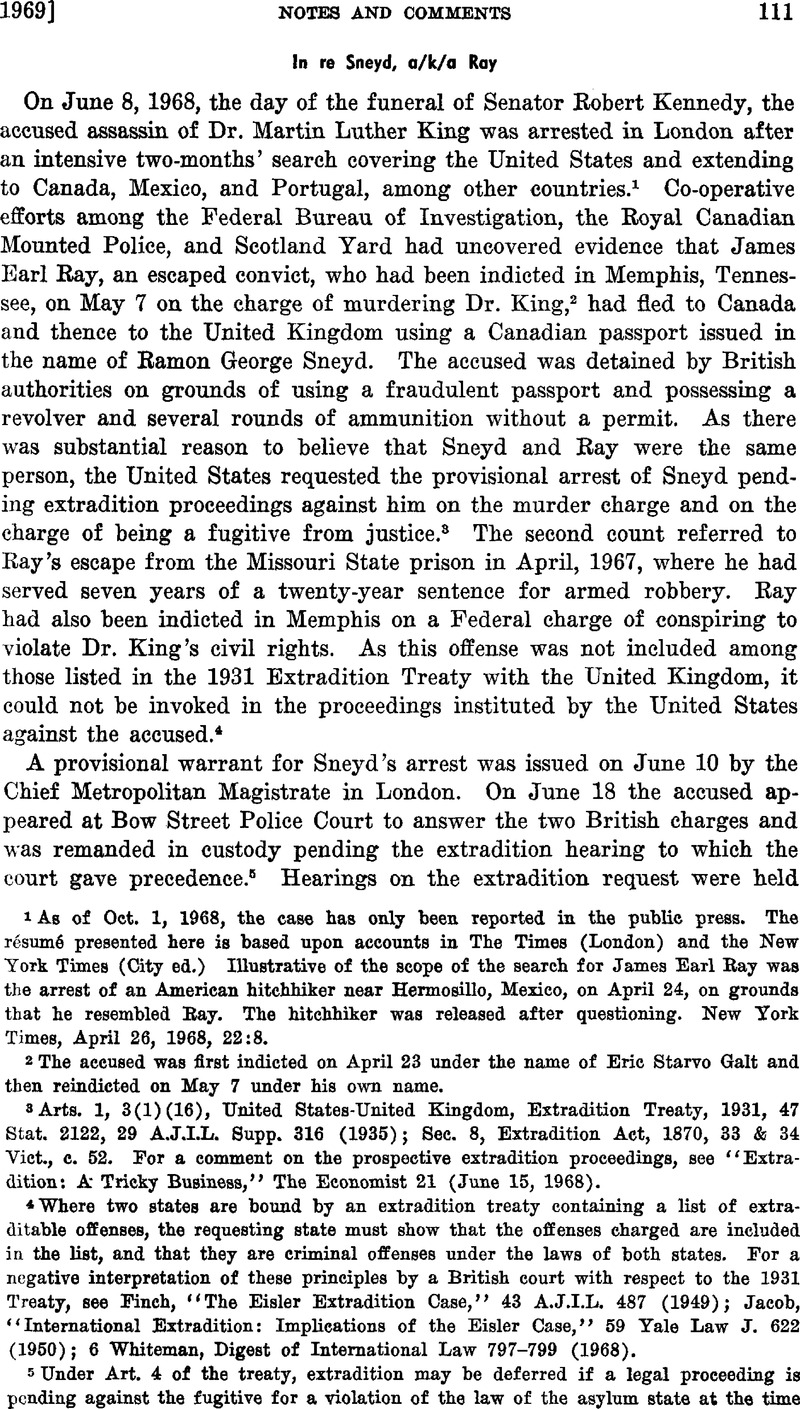No CrossRef data available.

1 As of Oct. 1, 1968, the case has only been reported in the public press. The résumé presented here is based upon accounts in The Times (London) and the New York Times (City ed.) Illustrative of the scope of the search for James Earl Ray was the arrest of an American hitchhiker near Hermosillo, Mexico, on April 24, on grounds that he resembled Ray. The hitchhiker was released after questioning. New York Times, April 26, 1968, 22:8.
2 The accused was first indicted on April 23 under the name of Eric Starvo Gait and then reindicted on May 7 under his own name.
3 Arts. 1, 3(1) (16), United States-United Kingdom, Extradition Treaty, 1931, 47 Stat. 2122, 29 A.J.I.L. Supp. 316 (1935); Sec. 8, Extradition Act, 1870, 33 & 34 Vict., e. 52. For a comment on the prospective extradition proceedings, see “Extradition: A Tricky Business,” The Economist 21 (June 15, 1968).
4 Where two states are bound by an extradition treaty containing a list of extraditable offenses, the requesting state must show that the offenses charged are included in the list, and that they are criminal offenses under the laws of both states. For a negative interpretation of these principles by a British court with respect to the 1931 Treaty, see Finch, “The Eisler Extradition Case,” 43 A.J.I.L. 487 (1949); Jacob, “International Extradition: Implications of the Eisler Case,” 59 Yale Law J. 622 (1950); 6 Whiteman, Digest of International Law 797-799 (1968).
5 Under Art. 4 of the treaty, extradition may be deferred if a legal proceeding is pending against the fugitive for a violation of the law of the asylum state at the time that the extradition request is made. The gravity of the extradition charges here outweighed the British charges.
6 Sec. 10, Extradition Act; Art. 9, 1931 Treaty.
7 The political character of a charge may be brought forward at several stages in extradition proceedings under the 1870 Act. Sec. 7 of the Act authorizes a Secretary of State to deny a request for the arrest of a fugitive pending an extradition hearing, if the charge appears to be political in character. The accused may present evidence of the political character of the charge at the extradition hearing (§9). Extradition will be denied for a political offense or where the fugitive can prove that the “requisition for his surrender has in fact been made with a view to try or punish him for an offence of a political character; … “ (§3(1).) See also $5, Extradition Act, 1873, 36 & 37 Vict., c. 60. The proscription of extradition on a political charge appears in Art. 6 of the treaty in essentially the same terms as §3(1) of the 1870 Act.
8 Art. 3(1) (16), 1931 Treaty; New York Times, July 3, 1968, 1:3.
9 Ibid.
10 The Times (London), June 28, 1968, 2:4.
11 Ibid.
12 Regina v. Governor of Brixton Prison, Ex parte Schtraks, [1962], 3 W.L.R. 1013 at 1027; The Times (London), June 28, 1968, 2:4.
13 In re Castioni, [1891] 1 Q.B. 149 at 159. See also In re Meunier, [1894] 2 Q.B. 415 at 419.
14 Regina v. Governor of Brixton Prison, Ex parte Kolczynski, [1955] 1 Q.B. 540 at 549.
15 [1962] 3 W.L.R. 1013 at 1032.